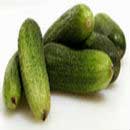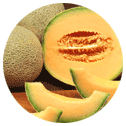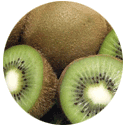 Full List of Fruits
Full List of Fruits  Cucumber
Cucumber
Cucumber
Scientific name - Cucumis Sativus
The cucumber belongs to the Cucurbitaceae (gourd family). The cucumber belongs to the genus Cucumis of which there are 20 to 25 species found mostly in Asia and Africa. Only two Cucumis sativus (cucumber) and Cucumis melo (melon, muskmelon and persian melon) are of commercial importance in North America. It is an annual trailing or climbing vine usually with flowers of both sexes on the same plant(monoecious).
Current market hybrids are produced on genetically gynoecious lines(all female blooms). Commercial seed lots have up to 10% of a monecious variety to provide sufficient pollen for fruit set. European greenhouse cucumbers set fruit without pollination (parthenocarpic). The cucumber is native to the northwest of India and has been cultivated there for at least 3000 years. The cucumber was known in France in the 9th century and was common in England in 1327.
Principle |
Nutrient Value |
Percentage of RDA |
Energy |
15 Kcal |
<1% |
Carbohydrates |
3.63 g |
3% |
Protein |
0.65 g |
1% |
Total Fat |
0.11 g |
0.5% |
Cholesterol |
0 mg |
0% |
Dietary Fiber |
0.5 g |
1% |
Vitamins |
||
Folates |
7 µg |
2% |
Niacin |
0.098 mg |
<1% |
Pantothenic acid |
0.259 mg |
5% |
Pyridoxine |
0.040 mg |
3% |
Riboflavin |
0.033 mg |
3% |
Thiamin |
0.027 mg |
2% |
Vitamin A |
105 IU |
3.5% |
Vitamin C |
2.8 mg |
4.5% |
Vitamin E |
0.03 mg |
0% |
Vitamin K |
16.4 µg |
13.6% |
Electrolytes |
||
Sodium |
2 mg |
0% |
Potassium |
147 mg |
3% |
Minerals |
||
Calcium |
16 mg |
1.6% |
Iron |
0.28 mg |
3.5% |
Magnesium |
13 mg |
3% |
Manganese |
0.079 mg |
3.5% |
Phosphorus |
24 mg |
3% |
Phosphorus |
||
Zinc |
0.20 mg |
2% |
Below mentioned are quick hacks as to how a cucumber is good for your body and soul
During hot summers when one cannot have the time to drink water frequently one can munch on a cucumber that keeps you hydrated. This fruit comprises of 96 percent water. It will happily compensate for the lack of frequent water drinking habits.
It not only hydrates your body but it also acts as a heat repulse, it has properties that Combats heat, both inside and out. By eating cucumber, your body gets relief from heartburn. Application of cucumber on your skin, will result in relief from sunburn.
Cucumber forms a key ingredient of any detox drink as it flushes out toxins. All that water in cucumber acts as aneffective cleanser, sweeping waste products out of your digestive system. With regular consumption, cucumber is known to dissolve kidney stones.
Not just the fruit but also the Cucumber peel is a good source of dietary fiber that helps in reducing constipation, and offers some shield against colon cancers by jettisoning toxic compounds from the gut.
Cucumber has several cancer fighting properties and it has been proven by science that including cucumber in your diet cuts down the risk of getting cancer. Several studies substantiate the same claim about its cancer-fighting potential.
People with blood pressure problem should swear by cucumber as cucumber stabilizes blood pressure.
For people who long for good skin naturally always use cucumber as a part of their beauty regime. One may have seen advertisements of women relaxing in spa with cucumber slices on their eyes, this indicates the universally acted fact that cucumber acts as a cooling agent that soothes the skin while decreasing swelling or inflammation caused by any antibacterial properties.
Cucumber are typically tropical plants that thrive the best in hot and humid climate. These plants are grown in two forms; one is by vining and the other on shrubs. Cucumber grown on vines are known to bear more fruits than ones grown on shrubs. They are not frost tolerant and will only survive when the soil is moist and has 70 degrees range of temperature. Cucumber can be eaten right after plucking them off the vines or can be stored in a cold storage for an extended shelf life of about 7-10 days if preserved with caution. They should be wrapped in a plastic and stored in a refrigerator to retain the crisp crunch.















